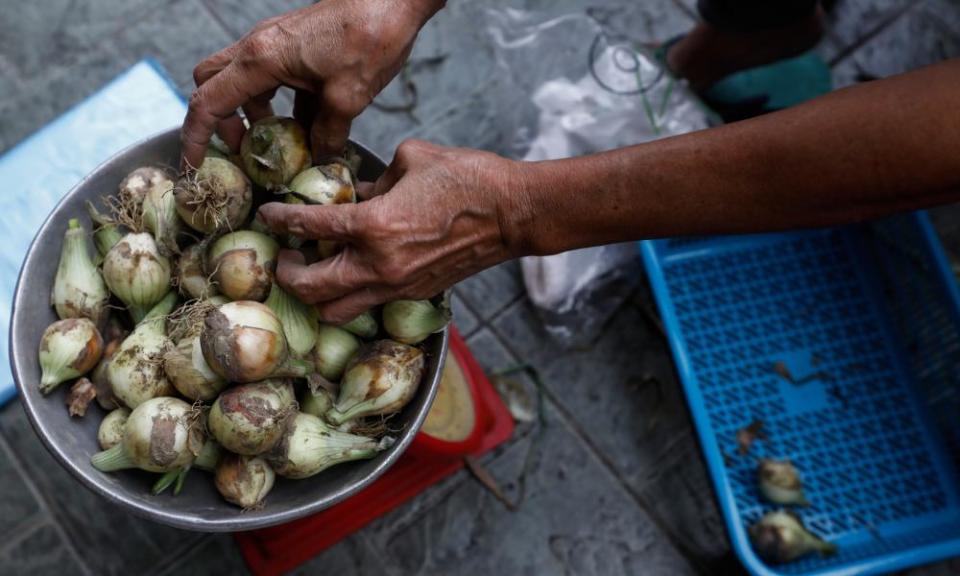Onion smuggling rackets thrive as staple becomes a luxury in Philippines

Their price soared so rapidly, some likened them to gold. Restaurants stripped them from their menus, officials warned travellers not to import them without special permission and millions of pesos’ worth have reportedly been seized in raids.
Between 500m and 600m pesos ($9m – $11m) worth of onions were impounded by officials last year, according to local media. The vegetable accounted for 30% of smuggled farm products.
Bags have been found in warehouse raids, and hidden among shipments of clothing. Last month, authorities uncovered 17m pesos’ worth of yellow onions inside containers labelled as holding blouses, slippers, and various household items. A few days before that, 20m pesos’ worth of onions, weighing 50,000kg, were found hidden among pastries and bread products.
One viral image sums up just how precious they have become: a bride clutches a bouquet of onions on her wedding day. Guests would be able to take home one of the expensive vegetables, she told local media.
But besides the wedding humour and police raids, however, there are stories of misery for both shoppers and farmers. This week, president Ferdinand Marcos Jr described the country’s food inflation as “an emergency situation”.
The rise in onion prices has been unprecedented, says Prof Leonardo Lanzona, of Ateneo de Manila University. The cost per kilogram reached up to 720 peso (US$13) in Metro Manila in late December – more than the daily minimum wage in the national capital region (533-570 peso). Prices have since fallen, but a kilogram of onions still costs more than a whole chicken.
It is not only onions that have soared in cost. The price of eggs has also risen, while the country has also faced a shortage of sugar.
The crisis has heaped pressure on Marcos Jr, who appointed himself agriculture secretary when he took office, promising he would boost production at a time when global food prices have risen sharply.
“Before it was sugar, now, it’s onions. We’ll end up having a hearing for everything in the kitchen,” said Senator Grace Poe at a senate hearing looking into the matter this month. She, like many others, has called for Marcos to appoint a separate agriculture secretary, arguing that they would have the time to address the problem.

Experts and farmers groups have proposed various reasons for the onion crisis – from a lack of cold storage, to rising post-pandemic demand, smuggling and the impact of natural disasters.
“Despite the lack of official statistics on onion production for 2022, the onslaught of Typhoon Karding, with … Noru in Nueva Ecija … most likely reduced local production,” said Prof Bates Bathan, of the University of the Philippines Los Baños.
Others point out that natural disasters are not uncommon in the Philippines, and that the government should have planned ahead and imported extra supplies much earlier. Warnings of looming shortages were made as early as August.
Lanzona suspects the cause of the crisis is about distribution, rather than supply. A lot of smaller and medium-scale businesses were closed down during the pandemic, he says, potentially skewing the market and giving bigger players, which had the capital to weather the storm, extra clout.
Marcos, who has criticised food imports in the past, permitted the import of 21,060 metric tonnes of onions earlier this month, with the first shipment arriving this week. But farmers say it’s coming too late, and that the produce will arrive just as local farmers harvest their crops.
Farmers’ representatives say they are already facing an immense struggle to stay afloat, with one group telling the Rappler news site that prices being charged for onions at Manila’s markets are far higher than what the farmers are paid for them.
At a recent senate hearing into the crisis, a widow described how her husband took his own life after an army worm infestation destroyed their crops, plunging the family into debt. She tried to continue farming, only for storms to again affect her harvest.
The prospect of imported goods is also a new threat, say farmers’ groups.
The Department of Agriculture has told local media there will be limits on imports to minimise the impact on local farmers. In an interview with CNN Philippines, Marcos Jr said there was no option but to import, and that he would also focus on improving production and cracking down on smuggling.
“I think the best way to solve this problem is to allow the farmers to transact directly with the consumers,” Lanzona added, saying the government should focus on giving farmers the technology to reach the market.
“Definitely, the farmers will be the ones who carry most of the burden,” Lanzona says

 Yahoo Sports
Yahoo Sports 